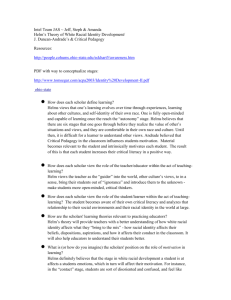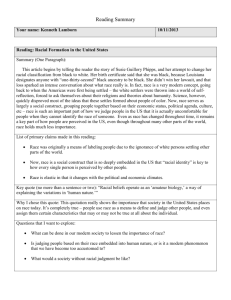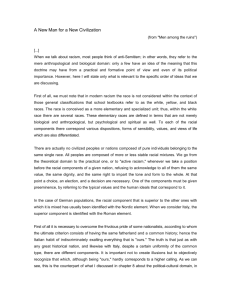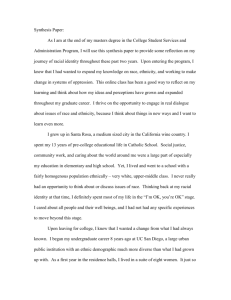About ISPRC
advertisement
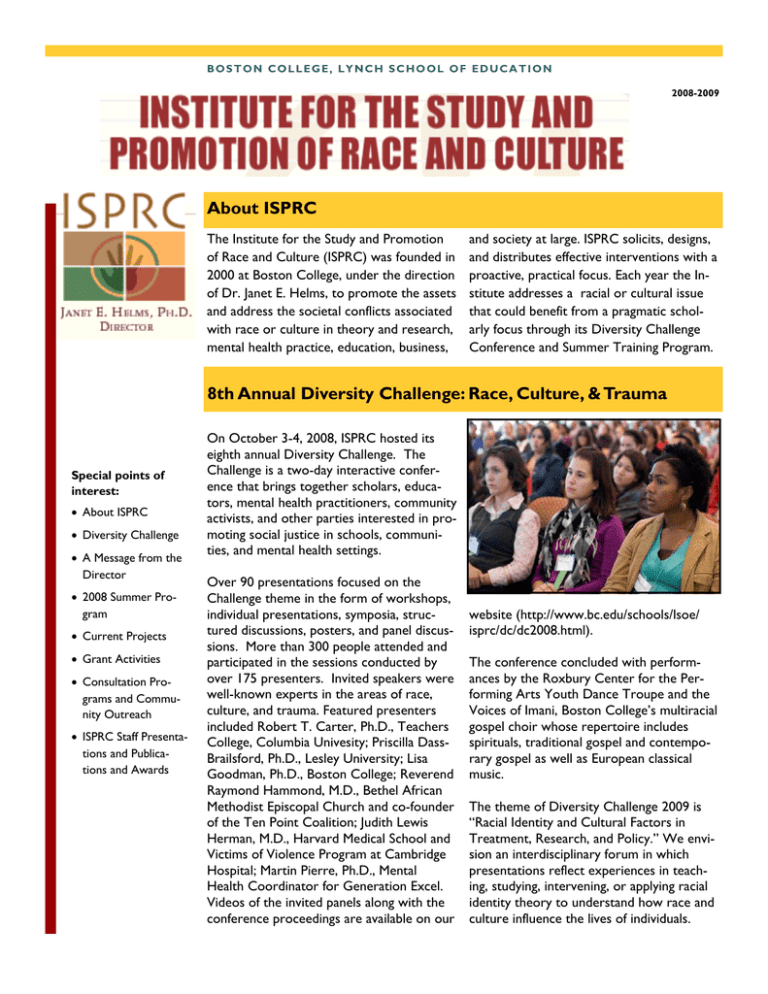
BOSTON COLLEGE, LYNCH SCHOOL OF EDUCATION 2008-2009 About ISPRC The Institute for the Study and Promotion of Race and Culture (ISPRC) was founded in 2000 at Boston College, under the direction of Dr. Janet E. Helms, to promote the assets and address the societal conflicts associated with race or culture in theory and research, mental health practice, education, business, and society at large. ISPRC solicits, designs, and distributes effective interventions with a proactive, practical focus. Each year the Institute addresses a racial or cultural issue that could benefit from a pragmatic scholarly focus through its Diversity Challenge Conference and Summer Training Program. 8th Annual Diversity Challenge: Race, Culture, & Trauma Special points of interest: About ISPRC Diversity Challenge A Message from the Director 2008 Summer Program Current Projects Grant Activities Consultation Programs and Community Outreach ISPRC Staff Presentations and Publications and Awards On October 3-4, 2008, ISPRC hosted its eighth annual Diversity Challenge. The Challenge is a two-day interactive conference that brings together scholars, educators, mental health practitioners, community activists, and other parties interested in promoting social justice in schools, communities, and mental health settings. Over 90 presentations focused on the Challenge theme in the form of workshops, individual presentations, symposia, structured discussions, posters, and panel discussions. More than 300 people attended and participated in the sessions conducted by over 175 presenters. Invited speakers were well-known experts in the areas of race, culture, and trauma. Featured presenters included Robert T. Carter, Ph.D., Teachers College, Columbia Univesity; Priscilla DassBrailsford, Ph.D., Lesley University; Lisa Goodman, Ph.D., Boston College; Reverend Raymond Hammond, M.D., Bethel African Methodist Episcopal Church and co-founder of the Ten Point Coalition; Judith Lewis Herman, M.D., Harvard Medical School and Victims of Violence Program at Cambridge Hospital; Martin Pierre, Ph.D., Mental Health Coordinator for Generation Excel. Videos of the invited panels along with the conference proceedings are available on our website (http://www.bc.edu/schools/lsoe/ isprc/dc/dc2008.html). The conference concluded with performances by the Roxbury Center for the Performing Arts Youth Dance Troupe and the Voices of Imani, Boston College’s multiracial gospel choir whose repertoire includes spirituals, traditional gospel and contemporary gospel as well as European classical music. The theme of Diversity Challenge 2009 is “Racial Identity and Cultural Factors in Treatment, Research, and Policy.” We envision an interdisciplinary forum in which presentations reflect experiences in teaching, studying, intervening, or applying racial identity theory to understand how race and culture influence the lives of individuals. Page 2 A Message from the Director I am happy to say that 2008-2009 marked another successful year for us at ISPRC. I continue to appreciate the support, commitment, and efforts of our staff and collaborators who made it possible. In addition to managing the many ongoing research projects and service activities, we continue to pursue new ways to accomplish our mission of promoting the benefits of addressing race and culture in a wide variety of domains. “Promoting social justice at home and around the world in teaching, research, and practice.” Let me share with you in this Newsletter information about the various research projects and conferences that took place through the auspices of We are looking forward to yet another exciting, the Institute during the year. In this issue of the enriching, and productive year at the Institute in Newsletter, we share the many other accomplish- 2009-2010. ments of the staff, welcome new members, and say farewell to members of our family who are — Dr. Janet E. Helms moving on to new ventures. ISPRC Summer Program, 2008 ISPRC held its popular Summer Program in August, 2008. The Workshop theme was the Integration of Race and Culture in Teaching and Workplace environments. This Program provided comprehensive training in a smaller, more intimate setting, focusing on experiential, didactic and interactive exercises that are intended to assist participants in integrating racial and cultural constructs into their environment. There was also comprehensive training in the areas of race and culture, and the integration of these concepts into school, workplace, and therapy settings. Page 3 Current Projects: Research Initiatives Central Tendency and Variability in Comparing African Americans and Whites’ Math Scores Comparisons between groups have been heavily focused on comparing the central tendencies of groups (e.g., mean scores). However, it is important to also consider the variability within group scores (e.g.,, standard deviation) to decide whether comparisons of means are appropriate. Researchers have examined this concept when investigating differences between women and men, but there has not been any research examining differences between racial groups. Therefore, this project is examining the variability of African Americans and Whites’ math scores as an alternative way of examining the racial-group “achievement gap” in math. Race and Counseling Supervision This project uses the narrative vignettes of mental health trainees to explore how conversations about race are initiated, received, and processed in clinical supervision and has resulted in an in-press manuscript describing these themes. Helms's Racial Social Interaction Model provided a framework for the race and supervision manuscript, which provides specific recommendations for trainees with regard to managing supervision relationships. Supervisors may also use the manuscript to improve racial social interactions with students under their supervision and engage in conversations about race and culture during supervision. Examining Race-Related Stress Experiences among Elderly African American Women According to health statistics, approximately 2.5 million members of the general population are elderly African Americans age 65 years and older. This group has a disproportionate number of chronic health and health-related problems relative to the White elderly population. Additionally, elderly African Americans have been found to suffer disproportionately from mental health concerns such as depression and anxiety. To address these types of mental health disparities, ISPRC conducted a study to examine the relationship between racial discrimination experiences, psychological distress, and racial identity statuses in a sample of elderly African American women using archival data from the Collaborative Psychiatric Epidemiology Surveys (CPES): National Study of American Life (Alegria, Jackson, Kessler, & Takeuchi). Findings will help mental health counselors and policy makers better understand the mental health disparities facing this population so that they can develop and use more effective culturally-responsive mental health services and policies for elderly African American women. Career Counseling with Indigenous Australians: Recommendations for Better Services This conceptual paper highlighted the current state of career counseling service use by Indigenous Australians, who must rely on White counselors as their sole service providers. Using Helms’s White racial identity development model as a framework, we examined the potential role and influence that White Australian counselors’ racial identity may have in cross-racial counseling interactions involving Indigenous Australians. In addition, we make recommendations as to how White career counselors can increase their own self-awareness and use culturally-appropriate orientations to work more efficaciously with Indigenous clients. .Asian Americans Experiences of Racism The category of “Asian Americans” consists of several ethnic groups that are usually grouped together despite vast differences in cultural and historical experiences in U.S. America. Whereas these individuals may share the same racial categorization, their ethnic differences definitively foster unique perceptions and lived experiences. At present, Chinese Americans and Filipino Americans comprise the two largest ethnic groups of Asian Americans (U.S. Census Bureau, 2000). To better understand the differing experiences of racism within these two groups, the purpose of this study was to compare both daily life experiences and generalized experiences of racism between groups of Chinese American and Filipino American college students. Analyses depict differences in experiences based on group membership, which supports the importance of exploring cultural and ethnic differences among socially constructed racial groups. Native American Images Study The use of Native American (or American Indian) images and symbols in American culture is often blatantly racist and offensive. One example of this is the use of Native American imagery by professional sports teams. A qualitative pilot study was designed to investigate individual and group reactions to a variety of images. The varying reactions to the images were analyzed to highlight differences between Native and non-Native research teams’ perceptions and a manuscript was developed that highlights how researchers’ perceptions differently influence research methodology and analysis. Page 4 Current Projects: Research Initiatives (cont.) Enhancing Achievement for Ethnic Minority Students in Post Secondary Education ISPRC continues to work with co-principal investigators who are either professors or applied psychologists from five other institutions, which include Fisk University, University of Miami, University of North CarolinaPembroke, College of New Rochelle, and Bowie State University. The purpose of the study is to examine whether racial and cultural factors (e.g. racial identity, stereotype threat, ways of coping) explain the standardized test performance (e.g. SAT, ACT) of racial/ethnic minority college students. The ongoing challenge for this project continues to be finding economic resources to fund this multi-site study. Multicultural Competency in Counseling: Implementing a Training Program within a Social Justice Orientation - An Evaluation of Supervisees’ and Supervisors’ Experiences with Race and Culture in the Principles and Techniques Lab As the counseling client population continues to grow progressively more diverse, multicultural competency training has become a vital aspect of graduate counseling programs. Research indicates that understanding how perceptions of race impact clients helps counselors to implement interventions to combat race-related structures of social oppression, and, thereby, bring about social change. Considering the salience of race and culture is the training goals of both the field of counseling psychology and the Boston College (BC) Lynch School of Education, the research team evaluated the quality of inclusion of race and culture in the training experiences of first-year students in the Masters program in Counseling Psychology and their doctoral supervisors. Data collection consisted of qualitative and quantitative measures, which were administered during the first and second semesters of the academic year. Data analysis is in progress. Pictures from Diversity Challenge 2008 Reception Page 5 Grant Activities: Currently Funded Received from National Institute of Mental Health (NIMH). NIMH Conference Grant. Addressing Cultural Factors and Mental Health Disparities in Research and Practice is in the third year of funding. This grant was awarded to fund three of the Diversity Challenge (2007, 2008, 2009) conferences hosted by ISPRC. The primary goals and objectives of these three annual conferences are to: (1) increase the cultural knowledge base of mental health researchers; (2) enhance the cultural knowledge base of mental health providers; (3) provide the skills necessary to effectively integrate cultural factors into mental health research and practice; and (4) develop strategies by which researchers and practitioners can collaborate with each other to effectively incorporate culture in their research and practice. Speakers for the conference are nationally and internationally known researchers and clinicians presenting in their areas of expertise via interactive formats. The thematic two-day conferences take place during the Diversity Challenge conference at Boston College in October of 2007, 2008, and 2009. Each thematic conference consists of a varied format consisting of plenary sessions, concurrent workshops, and information posters. Proceedings from the conference such as summaries of research reviews, speaker presentations, conference agendas, and links to PowerPoint presentations of invited speakers will be distributed through published monographs and posted on the ISPRC website. Grant Activities: Under Review Decreasing Infant Mortality Among Black Women Co-Principal Investigators: Robert T. Carter, PhD; Janet E. Helms, PhD; and Guerda Nicolas, PhD In this multi-site study, to be conducted concurrently in New York, Massachusetts, and Florida, the researchers intend to evaluate the effects on infant mortality of a stress-reduction intervention intended to help Black pregnant women cope with race-based stress. Women who participate in the intervention will be trained to administer it to other women like themselves with the assistance of a health professional. Parental Engagement and Activism in Children’s Education (PEACE) Principal Investigator: Janet E. Helms, PhD This project was intended to enhance school performance of children of Color or immigrant status by teaching their parents how to (a) interact effectively with teachers and administrators in culturally dissimilar school settings and (b) help their children understand and resist internalizing racism and xenophobia that they encounter in school settings. We developed Project Success in response to high school support staff’s perceptions that formerly successful students of Color quickly become underachievers once they enter high school. Whereas the tendency is to presume that the students have not received adequate academic skills necessary to achieve, another explanation is that they do not see themselves reflected in their teachers, peers, or the academic maProject Success Stair-Step Mentoring Program for K-12 terials to which they are exposed. Thus, they disengage, often Students of Color rebel, and find self-fulfillment in other life domains, although Principal Investigator: Janet E. Helms, PhD in our work with the students we have found that once they Project Success is a mentoring program for Black and Latino high are helped to critically think about the situations in which school students attending predominantly White public schools in they find themselves, they become more engaged in being the Boston Metropolitan area. It is a generational mentoring proacademically successful. Exposing them to college students of gram in which Black and Latino graduate students at Boston ColColor and a college campus allows high school students to lege mentor undergraduate Black and Latino students at Boston visualize higher education as an option for themselves early College who, in turn, mentor high school students. Parents serve on. College students’ motivating high school students to as support systems by meeting as a group with mentored students, achieve gives the undergraduates a sense of fulfillment as well as enhanced skills in coping with similar concerns in the colhigh school support staff, and ISPRC program staff at orientation and end of the year connection- building meetings; school support lege environment. Developing and trying out culturallystaff work from inside the schools to identify students and parents responsive interventions allows graduate students to increase their own educational and research skills and to discover who will benefit from the program, schedule meetings in the high schools between mentors and mentored students, contact parents, which types of interventions are most effective in enhancing and obtain parental consent for educational activities that occur on students’ academic success at all levels. the Boston College campus. Page 6 Consultation Programs and Community Outreach The SANKOFA Project The mission of this project is to provide a setting that empowers Black and Latino K-12 students in Boston area schools to remain resilient in the face of the racial and ethnic cultural discrimination that they encounter. Empowerment through the Jernigan Sankofa Program embodies an awareness of one’s personal cultural history and the sociopolitical history of race and gender. Reclaiming one’s past through an awareness of history promotes self-definition, rather than acceptance of definitions proposed and often imposed by society. It is this process of identity development that better enables students to enhance their personal resources, thus allowing them to resist barriers to achievement and persevere to attain academic success and positive relationships with teachers and peers. To date, Sankofa groups have been implemented in three elementary schools and the high school in Brookline, MA for 5 years; a combined total of seven groups have been conducted. The Sankofa Program has received funding for program development and research from the CEMMRAT grant (Research Development Grant, 2006) and the Ford Foundation (Diversity Dissertation Fellowship, 2007) under the supervision of Dr. Maryam Jernigan. healthy racial socialization (i.e., identification with one’s racial group) and development of coping skills (e.g., resistance) that negate demeaning societal messages aid in healthy adolescent identity development for youths of Color. Using educational instruction that highlights the cultural history of ethnic minorities, PS provides students with resources to increase their social, emotional, cognitive, and political competence, a necessary factor in promoting the achievement of youths of Color. Participants benefit from group interventions and one-on-one mentoring designed to promote their academic success (e.g. test preparation, time management). With a focus on raising critical consciousness, PS teaches students how to assess the influence that family, school, community, and larger societal forces (e.g., racial and cultural issues) have on the challenges they face. Finally, through monthly on-campus college visits and college preparatory workshops, participants are exposed to undergraduate education as the next step beyond high school. At the end of the year, participants reported increased self-esteem, racial pride, and future orientation (e.g., post secondary education planning) as a result of their mentoring relationships. Adolescent Advisory Board The Adolescent Advisory Board (AAB) was created to promote understanding of the needs of today’s adolescents. Board members are teenagers from schools in the Boston Metro area who are active and insightful leaders within their peer groups. As part of the advisory board, members are asked to help researchers at Boston College to better understand issues that are important to adolescents and to teach us the most appropriate and relevant way to speak to adolescent research participants. In addition to serving as advisors to researchers on many projects, the AAB seeks to enhance the leadership skills of youths through active participation on the board, increase their social skills and diversity training through interactions with youths from other institutions and diverse ethnic and SES background. Teaching, Learning, Race, & Culture The purpose of this session was to prepare the staff working with Boston College’s Options Through Education Transitional Summer Program (O.T.E.) for their work with students from racially and ethnically different backgrounds. O.T.E., coordinated by BC’s Office of AHANA Student Programs, assists promising, incoming first-generation, first-year students with significant financial need in their transition to Boston College via a 7-week intensive summer experience in which the students earn college credit and live on campus in the residence halls. The one-day workshop consisted of both didactic and experiential exercises that were intended to assist instructors, counselors, advanced student leaders, and staff members in integrating racial and cultural constructs into their classroom, residential, and co-curricular interactions with students and with each other Additionally, the session helped participants to understand the differences between social class and race, two concepts that are often misperceived and used interchangeably. Participants explored conceptual models for studying and understanding the role of race and culture in implementing classroom strategies to improve the quality of the students’ academic experiences, as well as for developing social and cultural programming to meet the needs of all students. Project Success Project Success (PS), a mentoring program which pairs Black and Latino high school students with Black and Latino undergraduates, aims to promote the academic excellence, awareness of racial and cultural strengths, and future orientation of youths of Color. The healthy academic, social, and emotional development of youths is largely influenced by the quality of their surroundings and interactions with others. Additionally, Page 7 ISPRC Staff: Presentations and Publications Christman, S., Keeles, O.W., & Harris, A.N. (February, 2009) “Conformed, Confused, and Conflicted: Addressing the Issue of Conformity in Racial Identity Development”. Symposia Presentation at Winter Roundtable 2009, Teachers College, Columbia University. Green, C. E. (July, 2009). It’s All About the Residents…and the Staff: Social Identities in Residential Living. Invited Workshop for the Boston College Office of Residential Life Professional Staff Training. Chestnut Hill, MA. Green, C.E., Liu, M.M. & Sass, T.L. (August,2008). Pre-practicum supervision: A place to talk about race? In S. Ladhani (Chair), Launching your career on solid footing: Incorporating race and culture in supervision. Symposium conducted at the meeting of the Annual convention of the American Psychological Association. Boston, MA. Green, C.E., Liu, M.M., Sass, T. L., & Helms, J.E. (August, 2008). Incorporating multicultural competence into social justice counseling psychology training: Evaluating doctoral-level supervisors’ and masters-level supervisees’ experience with race and culture in pre- practicum supervision. Poster presented at the meeting of the 115th annual convention of the American Psychological Association, Boston, MA. Helms, J.E. (September 2008), “Racial Identity Development,” Rhodes College. Helms, J.E. (November 2008), “Diversity in Testing and Assessment: Where are the People?” Regent University. Helms, J.E. (March, 2009) Endowed Chair Colloquium “Five Minutes with the New President,” Boston College. Helms, J.E. (March, 2009) Keynote Speaker, Great Lakes Counseling Psychology Conference, “Taking Action Against Racism in the Post Racism Era,” Ball State. Helms, J.E. (April, 2009) Keynote Speaker, Southeast Regional Counseling Psychology Conference, “Taking Action Against Racism in the Post Racism Era,” University of Georgia. Helms, J.E. (May, 2009) Panel Discussant, Forum on Understanding the Impact of Racial Identity Development on Counseling and Education, Auburn University. Helms, J.E. (May, 2009) Invited Speaker, Boston Consortium in Clinical Psychology, “Racial Identity in Assessment,” VA Boston and Boston Medical Center. Helms, J. E., & Green, C. E. (June, 2009). Racial identity, social class, and academic success. Invited workshop presented for the Options Through Education Transitional Summer Program. Boston College, Chestnut Hill, MA. Jernigan, M. M. (in press). To whom much is given: Balancing the demands of education, training, and leadership. Monograph: Proceedings of the 5th Annual National Black Counseling Psychology Conference. Jernigan, M.M. (August, 2008)“Going Back to Move Forward: How Sankofa Helps Girls of Color Resist Racism and Sexism in Schools.” Invited Address: 2008 Award for Distinguished Graduate Student in Professional Psychology. American Psychological Association Annual Conference. Boston, MA. Jernigan, M.M. & Green, C. E. (July, 2008). “Integration of Race, Culture, and Person Factors in Supervision.” Institute for the Study and Promotion of Race and Culture, Summer Program 2008: Integration of Race and Culture into Teaching and Workplace Environments. Chestnut Hill, MA. Liu, M., & Chen, C. (October, 2008). Asian Americans and racial microaggressions: Experiential differences between Chinese and Filipino Americans. Individual Presentation session presented at the Institute for the Study and Promotion of Race and Culture Diversity Challenge Conference, Chestnut Hill, MA. Mereish. E. H., Chmielewski, D., & Katz, J. (March, 2009). Program evaluation methods utilized at a residential, clinical, and educational facility for children and adolescents. Paper presented at the 23rd Annual Edward E. Kelly Conference, Albany, NY. Nicolas, G., Helms, J. E., Jernigan, M. M., Sass, T., DeSilva, A., & Skrzypek, A. (2008). A conceptual framework for understanding the strengths of Black youths. Journal of Black Psychology, 34(3), 261-280. Perry, J.C., Vance, K.S., & Helms, J.E. (2009). Using the People of Color Racial Identity Attitude Scale among Asian American college students: An exploratory factor analysis. American Journal of Orthopsychiatry, 2, 252-260. Perry, J.C., Satiani, A., Henze, K.T., Mascher, J., & Helms, J.E. (2008). Why is there still no study of cultural equivalence in cognitive ability tests? Journal of Multicultural Counseling and Development, 36, 155-167. Scanlon, D., Saxon, K., Cowell, M., Kenny, M., Gualdron, L. & Jernigan, M. M. (2008). Urban adolescents’ post-school aspirations and awareness. Remedial and Special Education,, 29(3), 161-174. Page 8 2008-2009 ISPRC Staff Dr. Janet E. Helms (Director) Kathleen Flaherty (Administrative Associate) Susan Ginivisian (Administrative Associate) Kisha Bazelais (Research Assistant) Cynthia Chen (Research Assistant) Angela DeSilva (Research Assistant) Carlton Green (Research Assistant) Alesha Harris (Research Assistant) Maryam Jernigan (Research Assistant) Marcia Liu (Research Assistant) Ethan Mereish (Research Assistant) Hammad N’cho (Research Assistant) Elizabeth Pierre (Research Assistant) Theresa Sass (Research Assistant) ISPRC Staff: Awards & Honors “Fostering national and international collaboration between educators, mental health providers, and scholars” Dr. Janet E. Helms President of the Society of Counseling Psychology (Division 17, the second largest Division of the American Psychological Association) Recipient of the Distinguished Elder Award at the 2009 National Multicultural Conference and Summit Recipient of the American Psychological Association Award for Distinguished Contributions in Research on Social Policy Carlton Green Recipient of the 2009 Donald J. White Teaching Excellence Award Dr. Maryam Jernigan 2008 APA/APAGS Distinguished Graduate Student in Professional Psychology 2008 Many Faces of Counseling Psychology Honor Diversity Challenge 2010 Race and Culture in Teaching, Training, and Supervision Call for proposals available on line at www.bc.edu/isprc by February, 2010 Proposals will be due Friday, April 16, 2010

